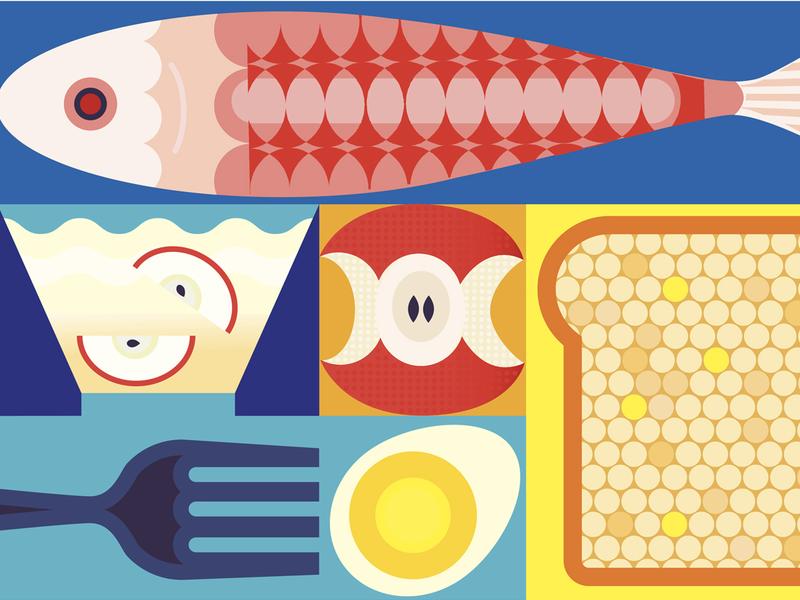From Paleo To Plant-Based, New Report Ranks Top Diets Of 2015

Despite the buzz about paleo and raw food diets, a new ranking of the 35 top diets puts these two near the bottom of the list.
Why?
The U.S. News & World Report rankings are based on evaluations by a panel of doctors, nutritionists and other health experts. For each diet, the experts evaluated short-term and long-term weight loss, ease of adherence, and how the advice stacked up against current dietary guidelines. The experts also considered health risks.
And when it comes to paleo, or the caveman diet, the verdict is that eating the way our hunter-gatherer ancestors did is not very realistic.
One expert concluded that "a true paleo diet might be a great option: very lean, pure meats, lots of wild plants." But the problem, according to the report, is that it's too difficult to follow in modern times. The experts say that in avoiding dairy, grains and other mainstays of the modern diet, paleo followers may miss out on key nutrients. And, the panel concludes, "if you're not careful about making lean meat choices, you'll quickly ratchet up your risk for heart problems."
Then there's the raw food diet, which calls for a plant-heavy diet of unprocessed, largely uncooked foods. The experts conclude that it's effective for weight loss, but they say it's "impossible to follow and its nutritional completeness and safety were concerns." They point out that while most adherents are vegan, some choose to eat raw or undercooked meat, fish, milk or eggs. And since the diet is very restrictive, they point out that it's not appropriate for children, since some restrictive diets have been linked to growth problems.
Similarly, Atkins, which is the low-carbohydrate, high-protein and high-fat diet — think steak without the potatoes — was given a low ranking (32nd out of 34), due to poor marks for long-term weight loss, safety and heart health. Many people on Atkins go heavy on meats, which can raise LDL cholesterol, the unhealthy cholesterol.
So, which diets come out on top?
For the fifth year in a row, the government-researched DASH diet (an acronym for Dietary Approaches to Stop Hypertension) ranked No. 1 overall diet. It's similar to the Mediterranean diet: heavy on fruits, vegetables, low-fat dairy, whole grains, poultry, fish and nuts.
There may not be any Hollywood stars promoting it, but as we've reported, DASH has been around for a long time. And there's solid evidence that it works, not just for weight control but also to lower high blood pressure, which is a common condition among adults in the U.S.
And when it comes to heart health, the top diet of 2015 is, once-again, the Ornish diet, which is a plant-based diet that's low in refined carbs and fat, developed by Dr. Dean Ornish. In his book Spectrum, Ornish describes a range of healthy lifestyle choices, including exercise, yoga and meditation for stress management, as part of his overall wellness plan.
The U.S. News panel calls the Ornish diet "safe and tremendously heart healthy." But the rub, according to the report, is that the eating plan is not easy to stick with due to the "severe fat restriction that the diet demands."
Dr. Ornish says he has heard this too-hard-to-follow criticism for years.
"This is the most common misconception about my work," he told The Salt this morning.
Ornish has developed comprehensive programs, which include his plant-based diet principles, to help people prevent and reverse heart disease. The programs are offered through medical centers, doctor's offices and hospitals. He says heart disease patients — as well as people who are at high risk of heart disease or Type 2 diabetes — who enroll do quite well in sticking with the diet.
"We have data from thousands of patients [who have participated in the program], and we're finding we're getting 85 percent to 90 percent adherence after one year" of being enrolled, Ornish told us.
To be clear, folks who try the Ornish diet at home are not getting the comprehensive support received by those formally enrolled in the heart disease programs, which include group exercise and meditation classes as well as group meals and nutrition lectures. So, part of the success is likely due to the encouragement and instruction the patients receive when they're enrolled.
Nonetheless, Ornish says, "the idea that it's too hard to change diet is not true."
9(MDEwODYxNTQyMDEzNjAxODk2Nzc2NzNmYQ001))